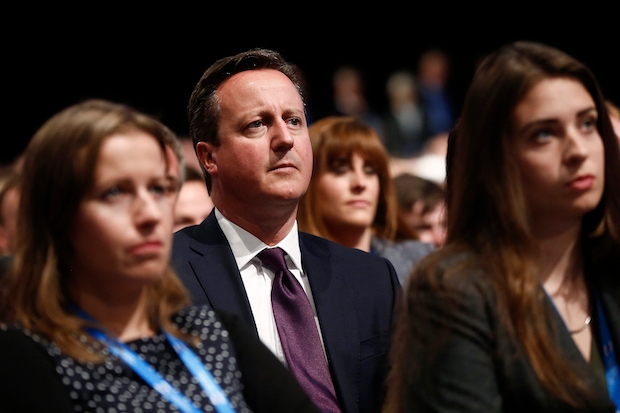‘Were we right to stop a massacre? Yes, we absolutely were,’ said David Cameron on his Radio 4 Today programme interview. But the real question is different: were we right to depose Gaddafi, given the chaos (and bloodshed) that has followed in Libya? Are things so much better for the citizens of Benghazi (and the 80,000 souls in Sirte) now that Islamic State has moved in? The Prime Minister stopping a potential massacre at Benghazi was fairly uncontroversial. But should he have then pressed on to topple the Libyan and created the vacuum now being filled with sectarian warfare and the migration crisis?
https://soundcloud.com/spectator1828/david-cameron-on-libya-6
We know quite a lot about all this due to the book which Mishal Hussein mentioned to the Prime Minister: Anthony Seldon’s biography, Cameron at No.10. Drawing on extensive interviews with aides and ministers it reveals that, after Benghazi was secured, Gen. Sir David Richards, then head of the military, wanted to call it quits. He told Cameron that:
‘Hostilities should cease and talks be opened with Gaddafi. Cameron ruled out the suggestion. Richards continued to press for a realpolitik approach and was suspicious of the French for being driven by ‘la glorie’ and wanted to work with the Libyan tribes who he thought would be pivotal. He complained that he was not being listened to’.
As for Cameron:
‘Cabinet colleagues started to complain that he was too preoccupied on what looked like a personal obsession… There were frustrations that there was no similar process to the one led by Nigel Sheinwald after the Iraq invasion looking int a post-war solution. “The prime minister simply didn’t have faith in the system and bypassed it, said one senior figure.”‘
This matters because David Cameron is now determined to remove Bashar al-Assad from Syria, and is similarly certain about the merits of regime change there – at a time when many are wondering whether Assad is preferable to Isil or al-Qaeda, who seem the only two realistic alternatives. ‘Assad cannot play a part in Syria’s future,’ Cameron said — and then went on to rehearse some of the lines that we can expect if there is a Commons debate on bombing Syria.
Jeremy Corbyn, he said, opposes action in Syria because he is unable to understand that Isil forms ‘a group of people in Iraq and Syria who are plotting day by day to kill people on the streets of Britain’. These are the very people who parliament voted not to help when Cameron wanted to bomb Assad in 2013, but things are changing fast. Cameron is framing opponents of British action as being in denial about the nature of Isil.
If the Prime Minister wants to win a new vote, he had best be careful here. He need to address the fact that many MPs on all benches of the Commons are unsure not about air strikes, but about whether the RAF’s involvement will make any difference. Or whether we’ll end up downing a Russia jet by mistake and getting sucked into a wider conflagration.
What Cameron never admits in these interviews is that Isil in Syria is already being bombed on a daily basis by the US Air Force. If the US Air Force hasn’t been able to disable Isil after the release of 15,000 bombs, why should a couple more RAF aircraft make much difference? Cameron won MPs’ permission to go after Isil in Iraq – and our ageing RAF bombers have made depressingly little difference. We have added just 5pc of total air strikes and our overall contribution has been pitiful. And yet we’re somehow anxious to stretch what remains of the RAF even further in Syria.
In other words, there is not much military objective in Syria. But there is a political objective. It would be cathartic for Cameron, especially after the Syria defeat of 2013.
‘Well, that was wide-ranging,’ Cameron said at the end of the interview, thinking that his microphone had been switched off. Perhaps he wasn’t expecting to be grilled so much about foreign affairs: I almost wish he hadn’t been because what he said at the start about social reform sounded very encouraging. I hope we hear more about this in his speech tomorrow. Meanwhile, here’s the whole interview:
https://soundcloud.com/spectator1828/david-camerons-tory-conference-interview







Comments